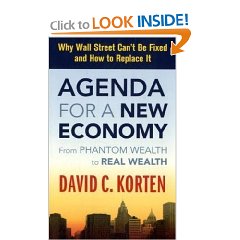
1. Anybody capable of writing The Great Turning (Volume 1 of 2) (EasyRead Large Edition): From Empire to Earth Community
2. In the context of all the complex books I read, this is one of the most complete, elegant, well-stated, thoughtful, and relevant books it's been my pleasure to enjoy in the past few years. This is a market- and life-changing work.
3. To stave off the ideologues who live in a fantasy world totally disconnected from the larger reality, this is the group represented on the one hand by American Fascists: The Christian Right and the War on America and on the other by Rule by Secrecy: The Hidden History That Connects the Trilateral Commission, the Freemasons, and the Great Pyramids.
My fly-leaf notes:
+ Truth teller, consistent view of crisis as potential for innovation and healing
+ Consistent with life and liberty–although the Green movement books do not appear her in any significant way, totally consistent with win-win or Nonzero: The Logic of Human Destiny where the only sustainable business is a green business.
+ Superb preface that outlines the book's genesis, for me this was a major plus up front.
+ Early discussion of the misperception of money as wealth rather than a form of exchange, of Wall Street as a form of legalized theft using illusions in place of tangible production.
+ WALL STREET CANNOT BE FIXED. I agree. See The Design of Business: Why Design Thinking is the Next Competitive Advantage. He says “We need to rebuild the system from bottom-up.” Later on he says that Wall Street is “corrupt beyond repair” and must be eliminated. I agree.
+ Global poverty (the #1 high-level threat according to the UN High-Level Threat Panel (which is senior to the fraud-ridden International Panel on Climate Change), is directly rooted in the falseness of the financial system and its inevitable failure (my words: the house of cards, the Ponzi scheme, is over–every Secretary of the Treasury since Central Banking was introduced has been a Bernie Madoff).
+ The book is deliberately short and simplified but not simple. Fifteen gray boxes and two tables provide substance in small coherent and easily digested bits.
+ The author slams Jeff Sachs and his Common Wealth: Economics for a Crowded Planet which I seem to recall doing as well (and first); and has high praise for James Speth's The Bridge at the Edge of the World: Capitalism, the Environment, and Crossing from Crisis to Sustainability.
+ He points out that the U.S. Government is cooking the books on inflation, and that one study he respects places inflation in 2008 at between 12 and 13 percent. As I have seen what my own dollar can buy cut in half over the past ten years, that passes my smell test.
+ He specifically identified the combination, under the “Reagan Revolution,” which I thought I was a part of, of CEOs, religious fundamentalists, anti-tax libertarians, and neo-conservative militarists (he does not mention ardent supporters of “Israel right or genocidal”) as being the down-fall of the economy. I would add Newt Gingrich and the end of bi-partisanship and Congressional responsibility, a tale told in The Ambition and the Power: The Fall of Jim Wright : A True Story of Washington, I see that as the point that winner-take-all spoils and patronage destroyed the integrity of Congress beyond repair, and the beginning of the end of the two-party system that is now a corurpt tyranny in league with Wall Street (see my own book, also free online, Election 2008: Lipstick on the Pig (Substance of Governance; Legitimate Grievances; Candidates on the Issues; Balanced Budget 101; Call to Arms: Fund We Not Them; Annotated Bibliography).
+ Another great quote: “Empire's greatest tragedy is the denial and suppression of the higher-order possibilities of our human nature.” I certainly agree and would point readers to the work of Stewart Brand, Harrison Owen, Paul Hawkin, Tom Atlee, Barbara Marx Hubbard, and others–others would add Ken Wilbur and Don Beck.
+ As the book draws to a close he notes that Thomas Jefferson (patron saint of Phi Beta Iota, the Public Intelligence Blog) had it right, workers must be owners for democracy to be sustained; we have the wrong indicators (e.g. gross domestic product does not distinguish between healthy and junk food); and we need to transition to “spaceship economics” as opposed to frontier economics, the first being a closed system. He credits Kenneth Boulding vice Buckminster Fuller on this point, which irritates me.
+ Seven principles of healthy living systems are articulated.
+ New Economy Priorities include reclaiming misallocated resources; military conversion; greening buildings and rolling back sprawl; and an end to advertising with a commensurate inclrease in public service media.
On page 122 he lists 12 points that are alone worth the price of the book.
The book ends with a notional speech by White House lead actor Barack Obama, and relates today's emerging bottom-up revolution to the original American Revolution–this is possible, but Obama is the last nail in the coffin, not the catalyst for positive change, in my view.
Over-all a phenomenal book, the one book to give for Christmas, the one book to insist your college-age and precocious senior high schoolers read.
In some ways, as I have been building a brick wall with 1470+ non-fiction books, this particular book gave me a rather special satisfaction, almost as if it were a finishing piece, an end piece, that brought together all that came before.




